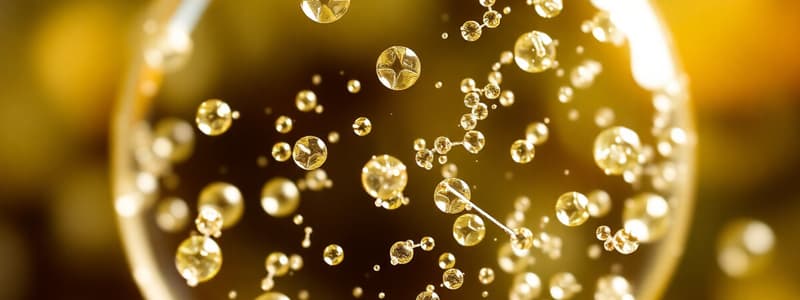Podcast
Questions and Answers
Where does aspirin absorption primarily occur in the gastrointestinal tract?
Where does aspirin absorption primarily occur in the gastrointestinal tract?
- Colon
- Duodenum
- Stomach (correct)
- Small intestine
Why might gastric lavage be less effective for aspirin overdose compared to basic drugs?
Why might gastric lavage be less effective for aspirin overdose compared to basic drugs?
- Aspirin is absorbed quickly in the stomach. (correct)
- Aspirin is primarily absorbed in the intestines.
- Aspirin is a more potent drug than codeine.
- Gastric lavage is only effective for liquid medications.
What form do salicylate molecules take at a urinary pH of 8.0?
What form do salicylate molecules take at a urinary pH of 8.0?
- Lipid-soluble
- Complexed form
- Solid form
- Ionized (water-soluble) (correct)
What happens to non-ionized salicylate molecules in the tubular filtrate?
What happens to non-ionized salicylate molecules in the tubular filtrate?
How does the pH of urine affect the removal of aspirin from the body?
How does the pH of urine affect the removal of aspirin from the body?
Why do weak acids like aspirin absorb better in acidic environments?
Why do weak acids like aspirin absorb better in acidic environments?
What is the consequence of aspirin being absorbed rapidly in the stomach?
What is the consequence of aspirin being absorbed rapidly in the stomach?
What effect does sodium bicarbonate have on the pH of the tubular filtrate?
What effect does sodium bicarbonate have on the pH of the tubular filtrate?
How does an increase in urinary pH affect aspirin excretion?
How does an increase in urinary pH affect aspirin excretion?
What is the primary action of sodium bicarbonate in managing aspirin overdose?
What is the primary action of sodium bicarbonate in managing aspirin overdose?
Why are non-ionized drugs more likely to be reabsorbed in the kidneys?
Why are non-ionized drugs more likely to be reabsorbed in the kidneys?
What is the effect of ion trapping in relation to acidic drugs?
What is the effect of ion trapping in relation to acidic drugs?
What type of environment do weak acids like aspirin favor for absorption?
What type of environment do weak acids like aspirin favor for absorption?
What happens to the renal excretion of aspirin when sodium bicarbonate is administered?
What happens to the renal excretion of aspirin when sodium bicarbonate is administered?
Why is it important to manage kidney and liver function in drug metabolism?
Why is it important to manage kidney and liver function in drug metabolism?
Flashcards are hidden until you start studying
Study Notes
Aspirin Absorption
- Aspirin is readily absorbed in the stomach due to its acidic nature.
- Weak acids are more likely to be absorbed in acidic environments like the stomach.
Gastric Lavage (Stomach Pumping)
- Gastric lavage is less effective with aspirin overdose compared to basic drugs like codeine.
- This is because aspirin absorbs rapidly in the stomach, so by the time a patient reaches the ER, a significant portion of the drug may already be in the bloodstream.
Salicylate Ionization
- At a urinary pH of 6.0, salicylate molecules remain predominantly in the non-ionized form.
- This allows for reabsorption in the kidneys, prolonging drug presence in the body.
Urinary pH and Salicylate Excretion
- At a urinary pH of 8.0, salicylate molecules become ionized (water-soluble).
- Ionized salicylates are less likely to be reabsorbed in the kidney tubules and are more readily excreted in the urine.
Sodium Bicarbonate in Aspirin Overdose
- Administering sodium bicarbonate increases urine pH, which makes the environment more alkaline.
- This promotes the ionization of aspirin, leading to less reabsorption and increased excretion.
Ion Trapping
- Sodium bicarbonate helps to facilitate ion trapping, where ionized aspirin is trapped in the renal tubules and excreted in the urine.
- This process is crucial in reducing circulating levels of aspirin and mitigating the risk of toxicity.
Studying That Suits You
Use AI to generate personalized quizzes and flashcards to suit your learning preferences.





